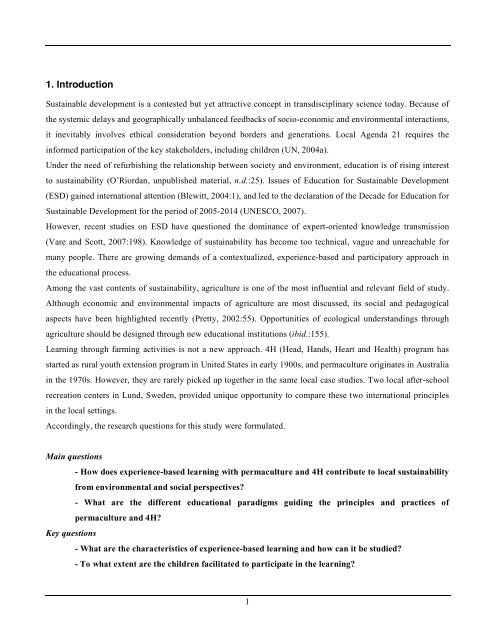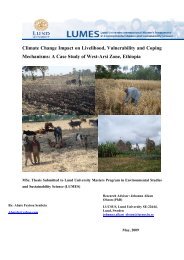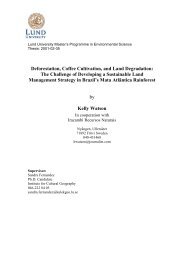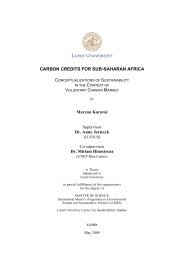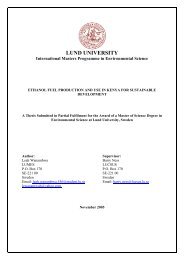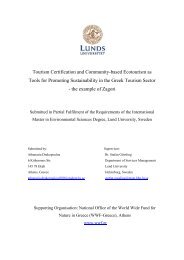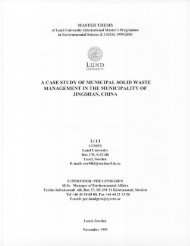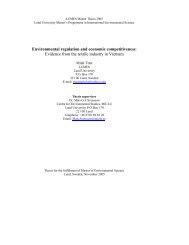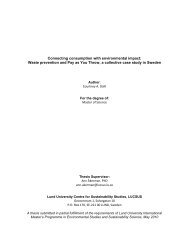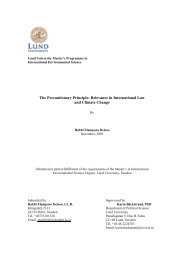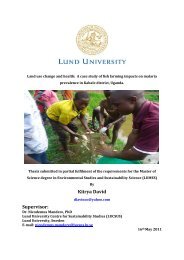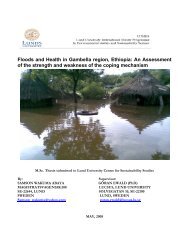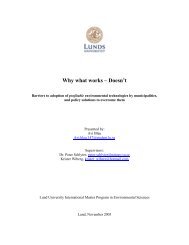Principles and Practices of 4H and Permaculture - lumes
Principles and Practices of 4H and Permaculture - lumes
Principles and Practices of 4H and Permaculture - lumes
Create successful ePaper yourself
Turn your PDF publications into a flip-book with our unique Google optimized e-Paper software.
1. IntroductionSustainable development is a contested but yet attractive concept in transdisciplinary science today. Because <strong>of</strong>the systemic delays <strong>and</strong> geographically unbalanced feedbacks <strong>of</strong> socio-economic <strong>and</strong> environmental interactions,it inevitably involves ethical consideration beyond borders <strong>and</strong> generations. Local Agenda 21 requires theinformed participation <strong>of</strong> the key stakeholders, including children (UN, 2004a).Under the need <strong>of</strong> refurbishing the relationship between society <strong>and</strong> environment, education is <strong>of</strong> rising interestto sustainability (O’Riordan, unpublished material, n.d.:25). Issues <strong>of</strong> Education for Sustainable Development(ESD) gained international attention (Blewitt, 2004:1), <strong>and</strong> led to the declaration <strong>of</strong> the Decade for Education forSustainable Development for the period <strong>of</strong> 2005-2014 (UNESCO, 2007).However, recent studies on ESD have questioned the dominance <strong>of</strong> expert-oriented knowledge transmission(Vare <strong>and</strong> Scott, 2007:198). Knowledge <strong>of</strong> sustainability has become too technical, vague <strong>and</strong> unreachable formany people. There are growing dem<strong>and</strong>s <strong>of</strong> a contextualized, experience-based <strong>and</strong> participatory approach inthe educational process.Among the vast contents <strong>of</strong> sustainability, agriculture is one <strong>of</strong> the most influential <strong>and</strong> relevant field <strong>of</strong> study.Although economic <strong>and</strong> environmental impacts <strong>of</strong> agriculture are most discussed, its social <strong>and</strong> pedagogicalaspects have been highlighted recently (Pretty, 2002:55). Opportunities <strong>of</strong> ecological underst<strong>and</strong>ings throughagriculture should be designed through new educational institutions (ibid.:155).Learning through farming activities is not a new approach. <strong>4H</strong> (Head, H<strong>and</strong>s, Heart <strong>and</strong> Health) program hasstarted as rural youth extension program in United States in early 1900s, <strong>and</strong> permaculture originates in Australiain the 1970s. However, they are rarely picked up together in the same local case studies. Two local after-schoolrecreation centers in Lund, Sweden, provided unique opportunity to compare these two international principlesin the local settings.Accordingly, the research questions for this study were formulated.Main questions- How does experience-based learning with permaculture <strong>and</strong> <strong>4H</strong> contribute to local sustainabilityfrom environmental <strong>and</strong> social perspectives?- What are the different educational paradigms guiding the principles <strong>and</strong> practices <strong>of</strong>permaculture <strong>and</strong> <strong>4H</strong>?Key questions- What are the characteristics <strong>of</strong> experience-based learning <strong>and</strong> how can it be studied?- To what extent are the children facilitated to participate in the learning?1


